Mark Nisbet
All about Mark Nisbet and his music
Other Accessories
Leads 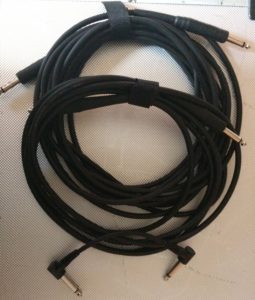 are required to link your equipment together and ensure the signal can get from the guitar via any effects and the amp to the loudspeaker. If you have a separate amp and speaker it is worth bearing in mind that though a guitar lead will work to connect them together, the higher signal level running to the speaker cabinet means that a specific speaker lead will do a better job and probably last longer. When buying guitar leads it is worth avoiding the cheapest leads, thinner cables can noticeably degrade the sound of the bass but more importantly the joins between lead and plugs tend to be much more fragile and so they tend to last a much shorter time.
are required to link your equipment together and ensure the signal can get from the guitar via any effects and the amp to the loudspeaker. If you have a separate amp and speaker it is worth bearing in mind that though a guitar lead will work to connect them together, the higher signal level running to the speaker cabinet means that a specific speaker lead will do a better job and probably last longer. When buying guitar leads it is worth avoiding the cheapest leads, thinner cables can noticeably degrade the sound of the bass but more importantly the joins between lead and plugs tend to be much more fragile and so they tend to last a much shorter time.
A good quality lead, treated well, will last for years. Treating a lead well means coiling it carefully and holding it together with a Velcro tie or similar. Leads that are knotted or allowed to turn into a birds-nest of cables will have a much shorter life and take much longer to sort out when setting up.
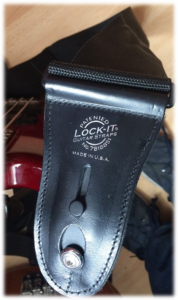 Straps Unless you are only going to play your bass sitting down and even then to be more comfortable, you will need a strap. The standard bass guitar is a heavy instrument and a nice wide strap will distribute the weight better on your shoulder, helping to avoid any aches and pains. Consideration should be given to how the strap attaches to the bass. Some straps have locking mechanisms built in or strap-locks can be purchased and fitted to the bass. Having the strap locked in place will prevent any embarrassing incidents on stage and protect your pride and joy from physical damage.
Straps Unless you are only going to play your bass sitting down and even then to be more comfortable, you will need a strap. The standard bass guitar is a heavy instrument and a nice wide strap will distribute the weight better on your shoulder, helping to avoid any aches and pains. Consideration should be given to how the strap attaches to the bass. Some straps have locking mechanisms built in or strap-locks can be purchased and fitted to the bass. Having the strap locked in place will prevent any embarrassing incidents on stage and protect your pride and joy from physical damage.
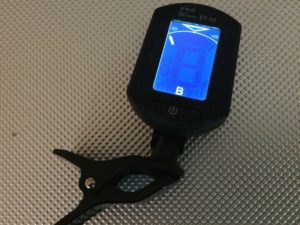
Tuners.Though you should definitely learn to tune your bass without the aid of a tuner, when playing with other musicians or in any in live situation it is much more convenient to have a tuner. Tuners nowadays come in two main types: plug in pedals which usually mute the signal while you are tuning and clip on tuners which allow you to tune up acoustically. Both work well, the former is a bit more involved to set up but usually works better in a noisy environment as it only picks up the signal from the plugged in instrument.
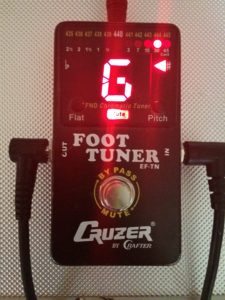
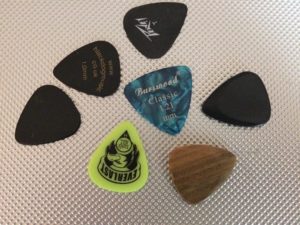 Plectrums are not essential to play bass but they have some physical advantages for the beginner and create a particular sound that suits some styles of playing. They do reduce wear and tare on the plucking hand of the player and in the hands of an expert allow extremely fast lines to be played. Type of plectrum is very much a question of personal preference though those used with bass tend to be bigger and stiffer than those used on guitar.
Plectrums are not essential to play bass but they have some physical advantages for the beginner and create a particular sound that suits some styles of playing. They do reduce wear and tare on the plucking hand of the player and in the hands of an expert allow extremely fast lines to be played. Type of plectrum is very much a question of personal preference though those used with bass tend to be bigger and stiffer than those used on guitar.